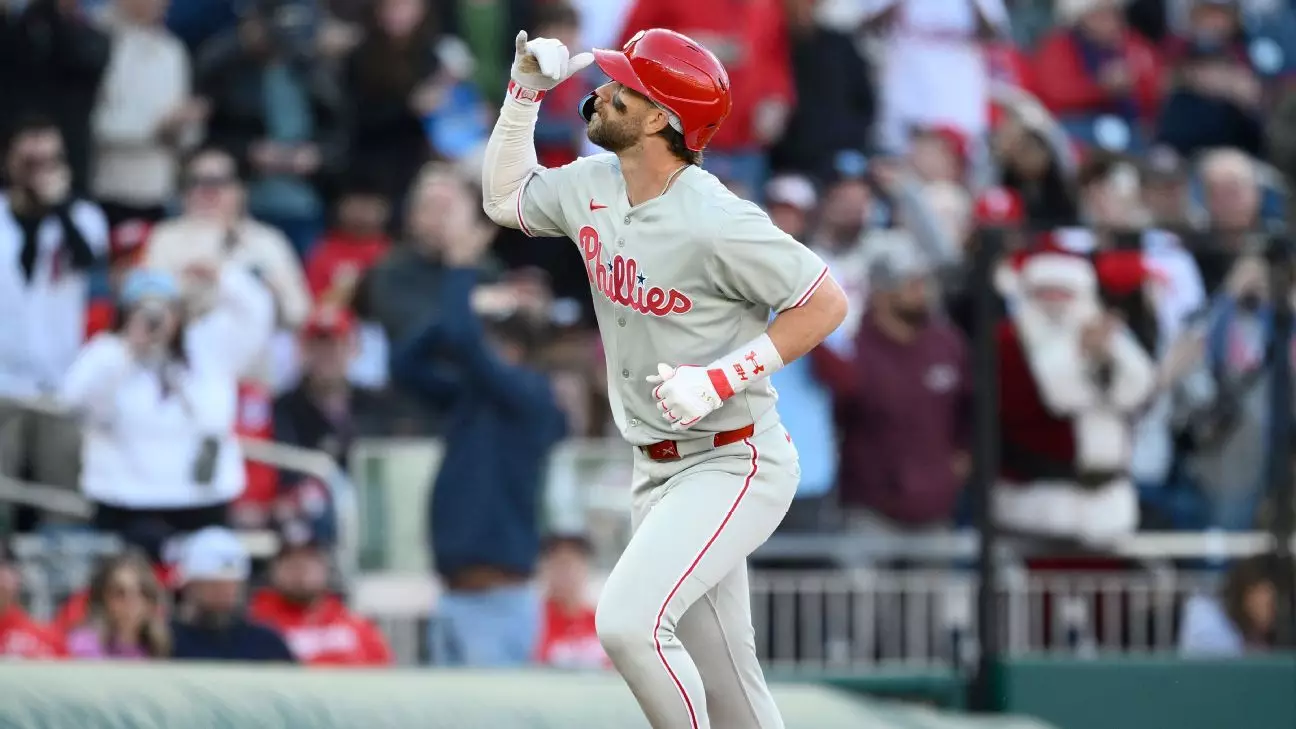The atmosphere at Nationals Park on Thursday was electric, charged with anticipation as fans awaited the opening game of the season. Yet amidst the thrill of baseball unfolding, one player’s return stole the spotlight: Bryce Harper, a former Washington National turned Philadelphia Phillies superstar. As his name echoed through the stadium, it was met with a chorus of jeers, a testament to the raw emotions that a player of Harper’s caliber can evoke. It was not just his former home crowd showing disdain; it was a multifaceted narrative steeped in loyalty, rivalry, and nostalgia unfolding right before the eyes of all who attended.
This toxic blend of hatred and reverence became clearer as Harper took to the plate multiple times during the game, each at-bat punctuated by catcalls and cheers, illustrating the complex relationship he maintained with the fans who once celebrated him as their own. Here was a player who had captured the hearts of many when he donned a Nationals jersey, only to later venture into the rival territory of the Phillies. The echoes of booing resonated throughout the stadium, yet Harper undeterred, showcased an unwavering quality that mirrors his entire career.
A Masterclass in Execution
In what can only be described as a masterclass in resilience, Harper seized the moment when it mattered most. Approaching the plate during the first inning while his team was behind, he delivered a decisive blow with a powerful home run that flew straight to the depths of the park. This wasn’t merely a triumph for Harper; it catalyzed a shift in momentum that ultimately secured the Phillies a 7-3 victory after an intense ten innings.
His ability to deliver when the stakes are high is what distinguishes Harper from many of his peers. As he himself articulated post-game, playing in Washington brings back a wave of memories. Despite the hostility from the stands, Harper expressed a clear affection for the ballpark and the people who work there, emphasizing an enduring connection with the city of Washington D.C. His words reveal the dichotomy of being a player who can be both viewed as a villain and a beloved figure, depending on the context. The cheers of admiration often blend with the jeers of rivalry, reflecting a player whose every move is closely scrutinized.
Performance Under Pressure
While Harper’s physical prowess certainly contributed to his remarkable comeback, the mental fortitude exhibited during the game spoke volumes about his character. He had struggled in Spring Training, famously chuckling about a home run that never truly counted, finding humor even in moments of struggle. But facing the formidable Washington pitching, which recorded a staggering 19 strikeouts, Harper acknowledged the challenges yet resolved to adapt and overcome.
Harper’s perspective on the high strikeout count and the challenges the Phillies faced—“we couldn’t see” as shared by teammate Alec Bohm—shows a deeper understanding of the game. In essence, he demonstrated a level of candor that is often sought after but seldom achieved by professional athletes who exist under the pressures of public scrutiny. Even though he highlighted that punching out 19 times was “comical,” he stressed the need for his team to adjust, signaling true leadership qualities.
The Resilient Player on Display
As the game evolved and shadows began to creep across the diamond, Harper’s evolution from being a young, raw talent to a seasoned veteran was palpable. His homer, the sixth of his career on Opening Day, tied him for the most among active players—indicative of his performance consistency. Each swing carries a story, and this particular one surmounted earlier tensions, reminding us why he was once regarded as an MVP.
Bryce Harper’s journey is a fascinating exploration of highs and lows, loyalty redefined, fanfare met with disdain, and personal triumph against adversities. He not only came back to a venue filled with mixed emotions but also emerged as the catalyst for victory. For Harper, hitting that monumental home run was not merely about power; it signified conquest over skepticism and doubt—a narrative arc worthy of admiration in the pantheon of baseball lore.


Leave a Reply